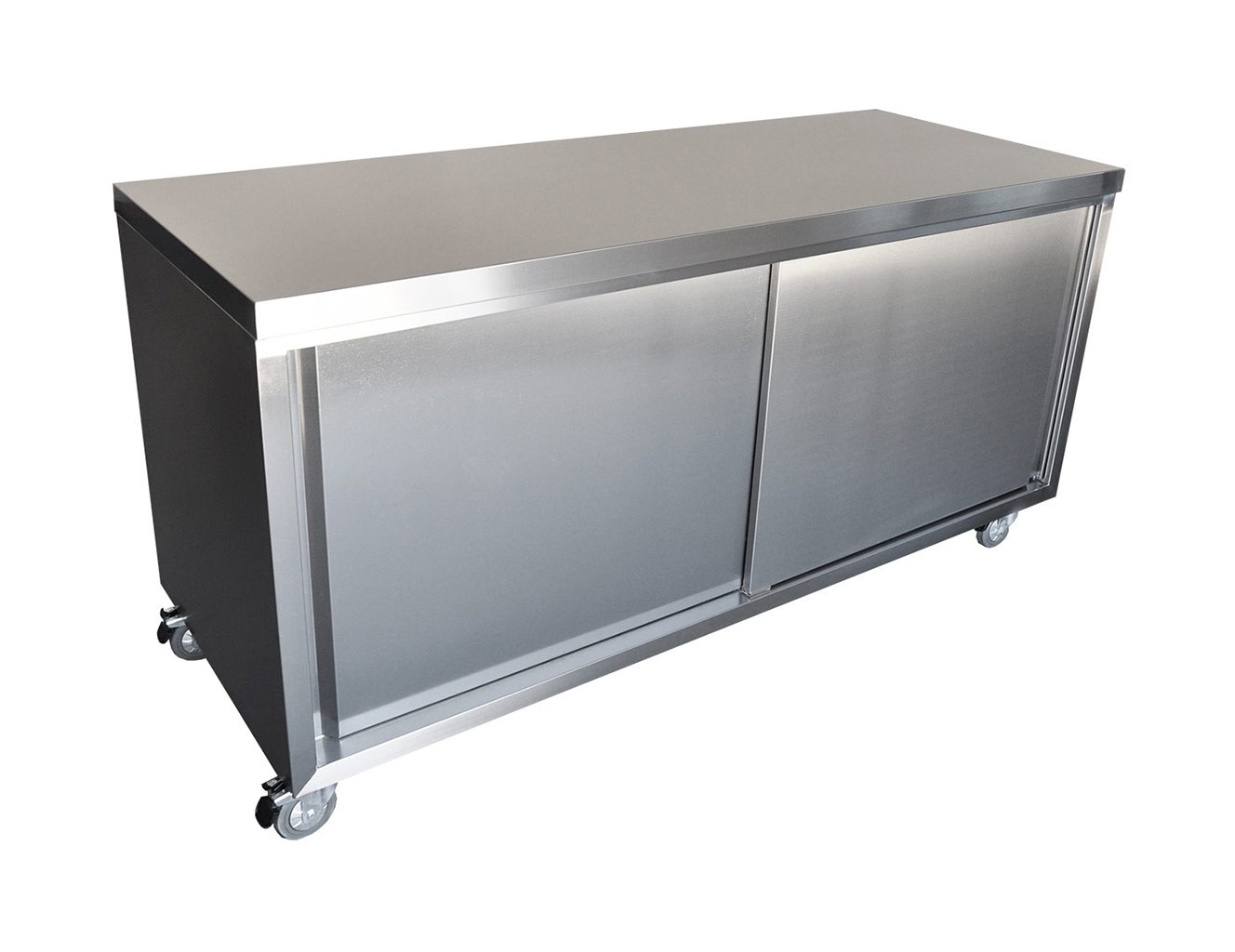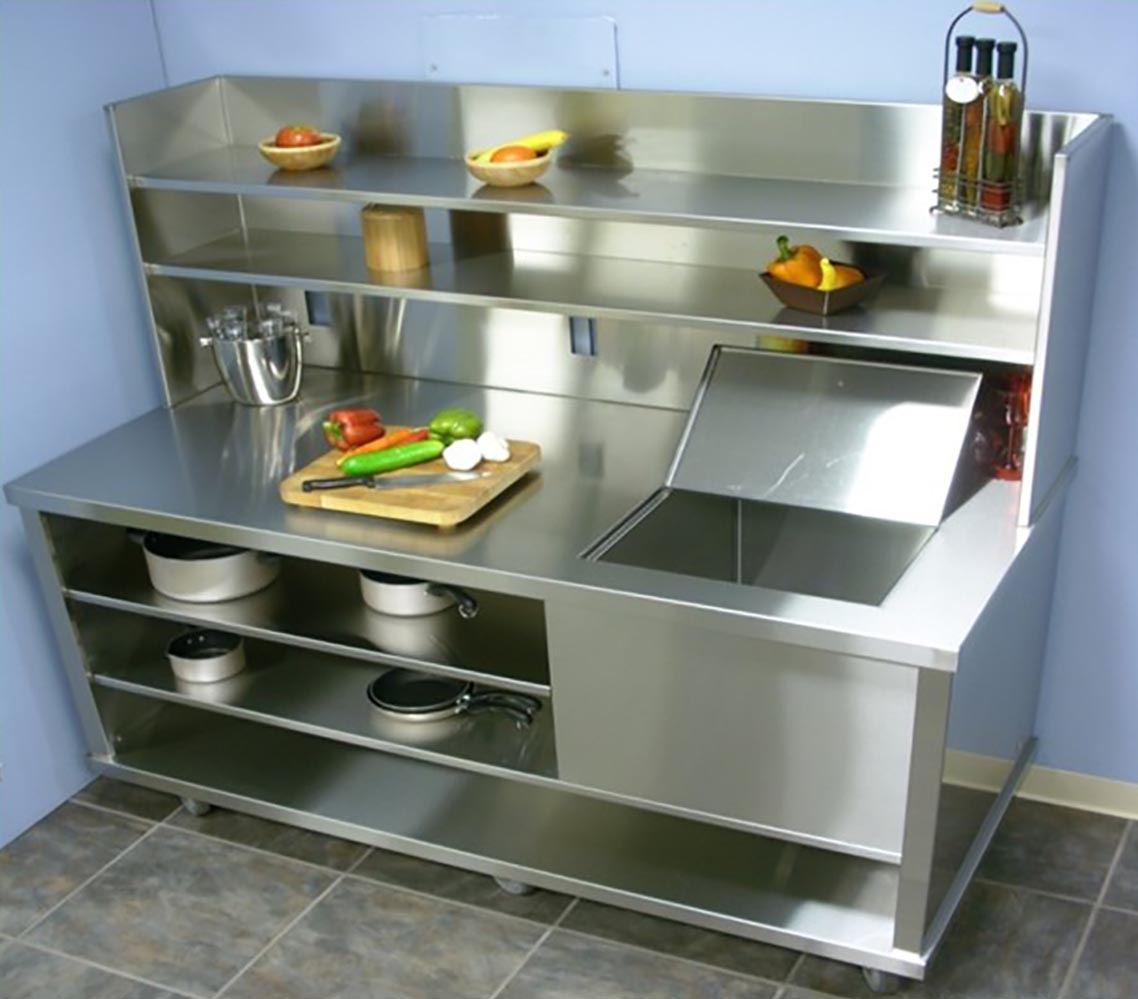Industrial Stainless Steel Cabinets

Industrial stainless steel cabinets are essential components in various industries, offering robust construction, durability, and resistance to harsh environments. Their unique properties make them ideal for demanding applications, ensuring long-lasting performance and reliability.
Properties of Stainless Steel, Industrial stainless steel cabinets
Stainless steel’s inherent properties make it an excellent choice for industrial cabinets. These properties include:
- Corrosion Resistance: Stainless steel contains chromium, which forms a protective oxide layer on its surface, preventing rust and corrosion. This layer shields the metal from the damaging effects of moisture, chemicals, and other corrosive agents common in industrial settings.
- Durability: Stainless steel is known for its exceptional strength and durability, able to withstand heavy loads and impacts. Its resistance to wear and tear makes it suitable for handling heavy equipment, tools, and other industrial materials.
- Hygiene and Cleanability: The smooth, non-porous surface of stainless steel is easy to clean and maintain. It resists bacteria growth and contamination, making it ideal for applications requiring strict hygiene standards, such as food processing, pharmaceutical manufacturing, and healthcare facilities.
- Temperature Resistance: Stainless steel exhibits good resistance to extreme temperatures, making it suitable for use in high-heat environments like foundries, chemical plants, and power generation facilities.
Grades of Stainless Steel
Various grades of stainless steel are available, each with specific properties and applications:
- Austenitic Stainless Steel: The most common type, known for its excellent corrosion resistance, ductility, and weldability. It is often used in food processing, pharmaceutical, and chemical industries.
- Ferritic Stainless Steel: Offers good corrosion resistance and high strength but is less ductile than austenitic steel. It is commonly used in automotive parts, kitchen equipment, and industrial machinery.
- Martensic Stainless Steel: Known for its high strength and hardness, making it suitable for applications requiring wear resistance, such as cutting tools and surgical instruments.
- Duplex Stainless Steel: Combines the properties of austenitic and ferritic stainless steel, offering superior corrosion resistance, strength, and toughness. It is used in demanding applications like oil and gas exploration, chemical processing, and marine environments.
Industries Using Industrial Stainless Steel Cabinets
Industrial stainless steel cabinets find wide applications across diverse industries:
- Food Processing: Cabinets are used to store ingredients, equipment, and finished products, ensuring hygiene and food safety.
- Pharmaceutical Manufacturing: Cabinets are crucial for storing and handling pharmaceuticals, maintaining sterility and compliance with regulatory standards.
- Chemical Processing: Cabinets provide safe and secure storage for chemicals, protecting personnel and the environment.
- Healthcare: Cabinets are used in hospitals, clinics, and laboratories for storing medical equipment, supplies, and sensitive materials.
- Electronics Manufacturing: Cabinets are used for storing and handling electronic components, protecting them from dust, moisture, and static discharge.
- Automotive: Cabinets are used in manufacturing plants to store tools, parts, and equipment, ensuring efficient workflow and organization.
Types of Industrial Stainless Steel Cabinets

Industrial stainless steel cabinets are essential components in various industries, providing secure and durable storage solutions for tools, equipment, and valuable materials. These cabinets are designed to withstand harsh environments and offer superior protection against corrosion, making them ideal for demanding applications.
Classifying Industrial Stainless Steel Cabinets
Industrial stainless steel cabinets can be categorized based on their design, functionality, and intended applications. The following table Artikels some common types of cabinets, their features, and typical uses:
| Cabinet Type | Features | Typical Applications |
|---|---|---|
| Wall-Mounted Cabinets | Compact size, easy installation, suitable for smaller items and tools. | Workshops, garages, laboratories, medical facilities. |
| Floor-Standing Cabinets | Larger capacity, robust construction, suitable for heavy-duty equipment and materials. | Warehouses, factories, industrial plants, chemical processing facilities. |
| Mobile Cabinets | Equipped with wheels or casters, allowing for easy movement and accessibility. | Hospitals, laboratories, food processing plants, mobile workshops. |
| Explosion-Proof Cabinets | Designed to prevent the ignition of flammable materials, crucial for hazardous environments. | Oil and gas refineries, chemical plants, pharmaceutical manufacturing facilities. |
| Refrigerated Cabinets | Integrated with cooling systems to maintain a specific temperature for sensitive materials. | Food storage, pharmaceutical storage, laboratories, research facilities. |
Visual Representation of Cabinet Types and Components
Imagine a visual representation depicting various cabinet types, each with distinct features and components. The wall-mounted cabinet would be compact and easily installed on a wall, while the floor-standing cabinet would be larger and more robust, standing on the floor. Mobile cabinets would have wheels or casters, enabling easy movement. Explosion-proof cabinets would feature special seals and ventilation systems to prevent ignition. Refrigerated cabinets would include cooling units and temperature control mechanisms. This visual representation would clearly illustrate the different designs and functionalities of industrial stainless steel cabinets.
Advantages of Industrial Stainless Steel Cabinets

Industrial stainless steel cabinets offer numerous benefits, making them a popular choice for various industrial applications. These cabinets provide a durable, hygienic, and corrosion-resistant storage solution, ensuring the safety and longevity of valuable equipment and materials.
Durability and Strength
Stainless steel is renowned for its exceptional strength and durability, making it ideal for industrial environments where heavy loads and harsh conditions are common. Its high tensile strength allows it to withstand impact, vibration, and heavy weight, ensuring the structural integrity of the cabinets even under demanding conditions.
Hygiene and Cleanliness
Stainless steel’s non-porous surface prevents the accumulation of bacteria, mold, and other microorganisms, making it an excellent choice for industries where hygiene is paramount. Its smooth surface is easily cleaned and sanitized, minimizing the risk of contamination and ensuring a clean and safe environment.
Corrosion Resistance
Stainless steel exhibits exceptional resistance to corrosion, making it suitable for use in environments exposed to moisture, chemicals, and harsh weather conditions. Its inherent resistance to rust and other forms of corrosion ensures the long-term durability of the cabinets, minimizing maintenance requirements and extending their lifespan.
Comparison with Alternative Materials
Compared to alternative materials commonly used in industrial applications, stainless steel cabinets offer distinct advantages:
- Durability: Stainless steel cabinets are significantly more durable than cabinets made from materials like wood or plastic, which are prone to damage from impact, moisture, and chemical exposure.
- Hygiene: Unlike materials like wood, which can harbor bacteria and mold, stainless steel’s non-porous surface provides a hygienic and easily sanitized storage solution.
- Corrosion Resistance: Unlike materials like iron or aluminum, which are susceptible to corrosion, stainless steel offers superior resistance to rust and other forms of corrosion, ensuring long-term durability.
Real-World Examples
The benefits of stainless steel cabinets are evident in various industries:
- Food Processing: In food processing plants, where hygiene is critical, stainless steel cabinets are used for storing ingredients, equipment, and finished products, ensuring food safety and minimizing contamination risks.
- Pharmaceutical Industry: Stainless steel cabinets are widely used in pharmaceutical facilities for storing sensitive medications, chemicals, and equipment, ensuring product quality and preventing contamination.
- Chemical Industry: In chemical plants, where corrosive substances are handled, stainless steel cabinets are essential for storing chemicals, equipment, and other materials, preventing corrosion and ensuring safe storage.
Industrial stainless steel cabinets are renowned for their durability and hygiene, making them ideal for demanding environments. When designing these cabinets, it’s crucial to consider the width of the face frames, which can significantly impact the overall aesthetic and functionality.
To ensure a seamless look and optimal performance, understanding how wide are cabinet face frames is essential. This knowledge allows for precise cabinet construction, resulting in robust and visually appealing industrial stainless steel cabinets that meet the specific needs of the application.
Industrial stainless steel cabinets bring a sleek, modern aesthetic to any kitchen, but sometimes you need more vertical space for your culinary essentials. A 90 inch tall pantry cabinet can be the perfect solution, offering ample storage for everything from spices to baking supplies.
These tall cabinets are often made of durable materials like stainless steel, seamlessly blending with the industrial design of your existing cabinets.
